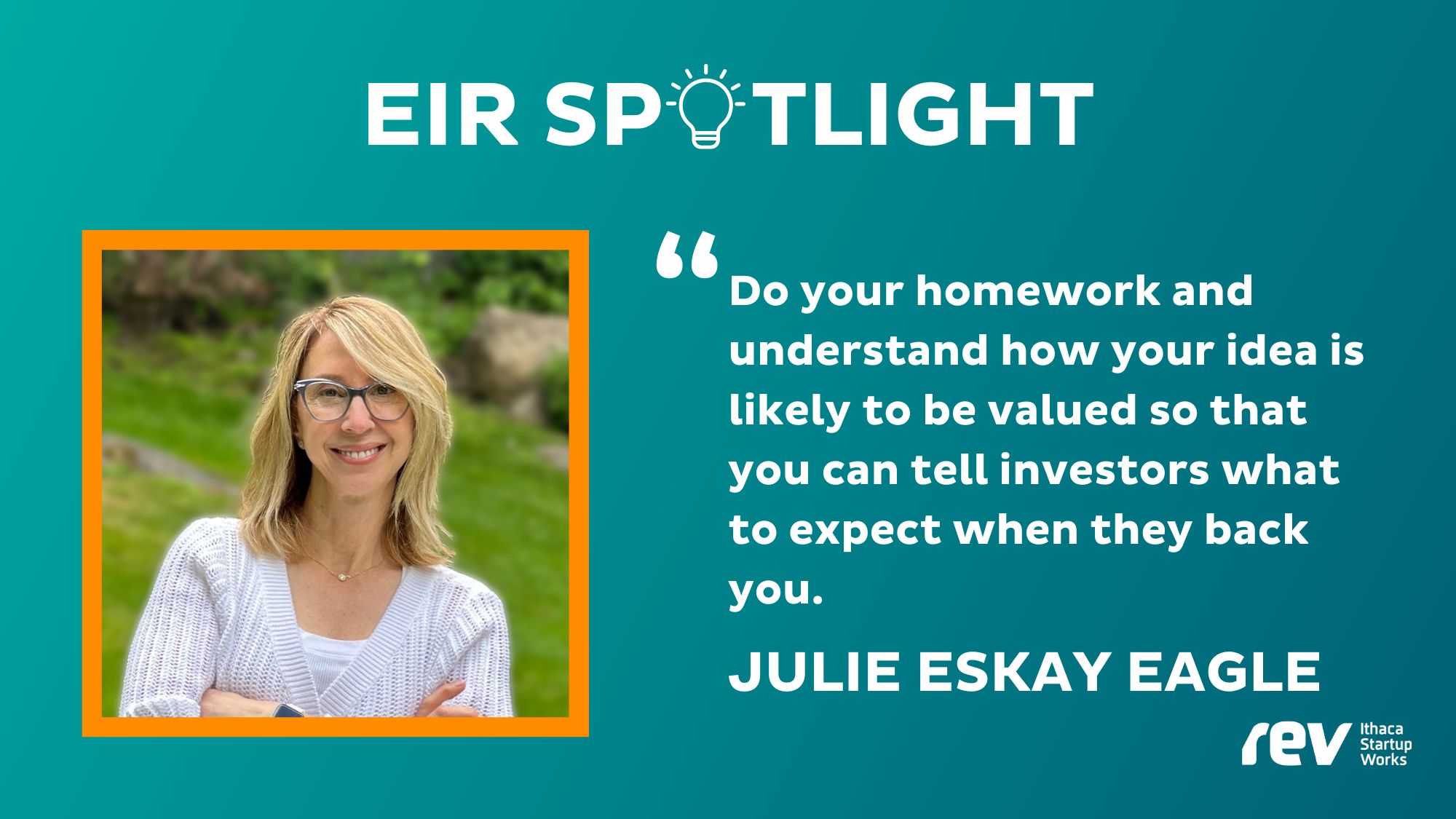
Q&A with Entrepreneur in Residence Julie Eskay Eagle
Among the vast set of resources that Rev: Ithaca Startup Works’ member companies are privy to is guidance from an experienced group of Entrepreneurs in Residence (EIRs) who are able to provide advice to founders at the various stages of their startup journeys. Rev is thrilled to have Julie Eskay Eagle join its team of EIRs, as she will be a trusted advisor to early-stage healthcare companies.
A healthcare entrepreneur and investor herself, Eskay Eagle founded DragonflyPHD in 2019. A software service platform that provided resources to independent pharmacies and urgent care operators during the pandemic.
Eskay Eagle earned a bachelor’s degree in Biomedical Ethics from Cornell, going on to receive an MBA from Columbia Business School. With a background in consulting and investment banking, she currently sits on the Board of Advisors for the Sloan Master of Health Administration program in the Cornell Jeb E. Brooks School of Public Policy.
Eskay Eagle’s experience in the healthcare, consulting, and entrepreneurship sectors is a welcome addition to Rev’s EIR team and member companies. We sat down to learn more about her background and future as an Entrepreneur in Residence.
What are you most looking forward to in your new role of Entrepreneur in Residence?
I look forward to learning about the inventions and subject areas that young entrepreneurs are contributing to, and of course, getting to know some inspiring future captains of the industry!
What is the best piece of advice you would give an up-and-coming entrepreneur?
I’d offer two points: 1) When you’re pitching your idea, be sure to do some homework on your audience so you can adjust your message accordingly, and 2) Let them know what they can expect from investing in you and follow through. Assuming you’re successful, pitching your idea is only the beginning of your relationship. I received great advice when I was pitching my own business: Develop an understanding of how your business is likely to be valued and how it fits into a broader ecosystem. This gives you a “North Star” for your focus and forces you to do some homework so you can competently talk to investors what to expect when they back you. For example, are you planning to unseat an established player or do see yourself as a natural acquisition candidate for someone else? I think it’s also good to keep in mind that your current venture may not be a success, but that doesn’t mean you’ve failed your investors. If you set realistic expectations and meet them, keeping investors updated regularly gives you a chance to build credibility with your investors whether the venture is a success. If you have built a solid reputation with them and something doesn’t work out, you can go back to them with your next venture.
How has your experience shaped how you view entrepreneurship and the startup world?
Working in health care I’ve had a front-row seat to some of the biggest breakthroughs in medicine. I’m always blown away by the brilliant science and the vision that entrepreneurs produce. What I have come to appreciate more over time is the foresight and perseverance of the investors who back these breakthroughs and turn visionary science into medicine. In my experience it is not good luck, it’s deep expertise and hard work that leads these investors into deals. For example, in medicine, it can take over 20 years for a company to reach the market and even longer to exit the investment. I think finding the right investors and partners for your business for the long haul is critically important.
How do you think the healthcare industry can benefit from encouraging more entrepreneurial endeavors?
There are always medical challenges in healthcare, but the pandemic also exposed serious weaknesses in how we deliver and pay for care, so now there is a pressing need to find solutions to these problems as well. I think the industry can make great progress by applying entrepreneurial ideas and technologies that have solved problems in other industries to health care, from hospitality to payment technologies to 3-D printing. This could mean using federated learning models across data sets to better predict, diagnose, and treat diseases, 3-D printed bones, reinventing payments, more efficient clinical trial designs, and many other things. I could go on and on about how the industry could benefit from encouraging innovative entrepreneurial endeavors.
You might be wondering why these ideas aren’t coming from the industry already. The fact is that we’ve been through a period of aggressive consolidation and relatively lax anti-trust regulation over the last 10 years. As a result, the sectors that makeup healthcare are highly concentrated, so a few large companies dominate in pharmaceuticals, health insurance, and care delivery. As we all know, this doesn’t typically spawn innovation, so the companies dominating these sectors are likely to rely on acquiring young companies to grow, which means there will be more resources and exit opportunities available to entrepreneurs in the next few years.
